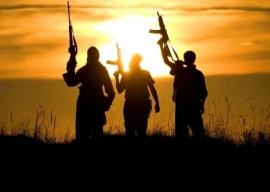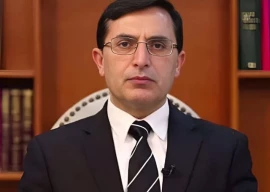
Pakistan cannot be held responsible for the security of US, Nato or Isaf forces in Afghanistan, said Prime Minister Yousaf Raza Gilani in a policy statement at a donors’ conference on Saturday.
Condemning the “propaganda blitz against Pakistan,” the premier said that the public recrimination is “most unfortunate … vitiates the atmosphere and is counter-productive.”
The policy statement comes amid increasingly strained ties between Pakistan and the United States, following a volley of accusations vis-à-vis Pakistan’s alleged ties with the Haqqani network.
The blame game tends to ignore the sacrifices by the people of Pakistan and negates all that the country has endeavoured to achieve over the last so many years, the premier said.
Gilani added that the allegations “betray a confusion and policy disarray within the US establishment on the way forward in Afghanistan.”
“While there have been terrorist attacks in Kabul and Wardak, there have also been numerous attacks on Pakistan launched from sanctuaries and safe havens in Nuristan and Kunar in Afghanistan. It is as much the responsibility of the Afghan National Army, Nato and Isaf not to allow such cross-border militancy,” the premier was quoted as saying.
“Let’s be objective and not get carried away by emotions,” the premier bluntly suggested to the United States.
Warning against unilateral action
Pakistan talked tough for a second straight day and warned the United States against any unilateral action on its soil, as head of the US Central Command General James Mattis met Army Chief General Ashfaq Parvez Kayani here on Saturday.
The US embassy in Islamabad confirmed that the meeting took place but refrained from sharing any details while the military’s media wing, the Inter-Services Public Relations (ISPR), initially neither confirmed nor denied the meeting.
“I don’t have full details of the meeting between Gen James and Gen Kiyani but I can confirm that Gen James arrived here on the weekend and has met Gen Kiyani,” said spokesperson for the US embassy in Islamabad Mark Stroh. “It is a regularly scheduled visit,” he added.
Sources said the Haqqani network and overall security situation of the region were discussed during the meeting.
“We have already made clear (to the US) that there will be a strong reaction to any unilateral offensive within our borders,” a Pakistani military official said. Gen Kayani also protested over cross-border attacks on Pakistani territory emanating from the Afghan soil, sources said.
Meanwhile, according to CBS news, cell phones recovered from the killed insurgents who had attacked the US embassy in Kabul last week revealed that the phones were used to call Pakistani intelligence operatives before and during the assault.
It is this evidence that led US Joint Chiefs of Staff chief Admiral Mike Mullen to announce in public that the Haqqani network is a “veritable arm” of Pakistani intelligence, CBS News reported on Saturday.
Khar stays on offensive
Over in the US, Foreign Minister Hina Rabbani Khar, on Saturday, also warned the United States against sending ground troops to fight the Haqqanis.
Khar said that there are red lines and rules of engagement with America, which should not be broken.
“It opens all kinds of doors and all kinds of options,” she was quoted by the Associated Press as saying. The comment was in response to a question about the possibility of US troops coming to Pakistan.
Khar, however, insisted that Pakistan’s policy was to seek a more intensive engagement with the US and that she would like to discourage any blame game.
“If many of your goals are not achieved, you do not make someone a scapegoat,” she said.
Retaliation possible
“There should be no ambiguity in any one’s mind that we will be unguarded again,” said a military official, referring to a possible unilateral strike like the May 2 operation when US helicopters entered deep inside the Pakistani territory undetected and killed the al Qaeda chief Osama Bin Laden.
“It will not happen any more … if two bullets are fired from the other side, we have to respond with two. This is standard procedure in such situations,” the official added when asked about the military strategy in case of a ground offensive or an aerial strike, besides drones, by the US forces.
Published in The Express Tribune, September 25th, 2011.
COMMENTS (19)
Comments are moderated and generally will be posted if they are on-topic and not abusive.
For more information, please see our Comments FAQ

















@Roflcopter: You said it right bro!!
Sounds like U.S. armed forces are considered "fair game". That doesn't bode well at all.
@John B
Only nieve people like you could beleive that ISI would be talking to terrorists on phone just before they gonna blowup :)
@Munib 20 billion dollors is equal to rubbish by what US asks you do more. Look at how US treats Israel. And then talk.
Knowing fully well that the militants will not survive, ISI still asked them to carry cell phones and have the militants call them so that the numbers could be recovered and fingers can be pointed towards ISI. Could the Americans not have been a bit more creative? I doubt, even the ISI can be that stupid!
The United States possesses the most sophistiacated intelligence-gathering technology, including the magic of bribe. They can locate people within a room and fire a precision missile from a drone that kills only their target. The actors who attackedthe US embassy in Kabul did not drop from Mars. They must have gone into the building from whre they launched their attack and taken positions at least a day before the attack. So, how come the Americans did not have any "credible intellignce" about Haqqani network having established their operational HQ so near their embassy?
@John B:
You don't seriously think the ISI through any of its operatives implicates itself by chatting with terrorists before they blow themselves up or get caught, do you?At least I hope Pakistan doesn't have such an incompetent intelligence agency!
No one accused Pakistan of being responsible for safety of anything but Pakistan! The accusations are that it's establishment is irresponsible, and is in bed with the terrorists.
"Meanwhile, according to CBS news, cell phones recovered from the killed insurgents who had attacked the US embassy in Kabul last week revealed that the phones were used to call Pakistani intelligence operatives before and during the assault."
lololol who they trying to fool? Were the insurgents also carrying letters signed by Pasha? US jokers have lost it.
Americans are clever enough..... so genius that they can find nuclear bomb from my car boot if they like to as they have found WMD in Iraq..........are not they great?? Cell phone from terrorists good one hmmmmmm
Total Failure of Americans, NATO & ISAF in Afghanistan.A Superpower with the latest weapon systems lost war to the Taliban, needs a scapegoat and Pakistan looks like an easy target.The US generals and Obama are misleading their countrymen.
We never asked Americans to come and sit in Afghanistan. They have come at their own choice and they must make arrangements for their own security.
Well yesterday Gen James and Gen Kiyani met. Today there is an unscheduled meeting of all PSOs of GHQ and Corps Commanders. It is common knowledge that the two meeting were not to discuss weather. Remember when Henry Kissinger gave ultimatum and after 9/11 Bush admin asked Pakistan to stand up and be counted, similar huddles were witnessed by one and all. It is clear the Military Junta will not be able to give salaries to Govt and Armed Forces if US Bank rolls do not arrive regularly. So Mr. Zardari and Mr. Gilani, it will now be your call. Military and ISI have let down Pakistan, so be a statesmen of maturity to break away from state policy of Terror as strategic assets . Also remember that weapons of mass destruction too can not be sustitute to deft handling of national affairs. Amen.
but pakistan is responsible for insecurity of US forces
PM Gilani has been very honest. When the Government has not been responsible for the security of its own people how can it ensure the security of coalition forces. It is unlikely that any Politicians can leave their home and travel even 5 kms without security. In such circumstances for people leaving home even to go to the Mosque has become a dangerous journey. The situation is very different from what it was in 2001, the global as well as local capacity to put up with lies stands greatly reduced. Those taking decisions and issuing press statements must take cognizance before any utterances.
"cell phones recovered from the killed insurgents who had attacked the US embassy in Kabul last week revealed that the phones were used to call Pakistani intelligence operatives before and during the assault.
The same scenario in Mumbai attack. Cell phone calls between the Mumbai attacker and the PAK handler, whoever they are.
The Kabul attack has strong similarities to Mumbai case, in terms of preparedness for a long haul fight to death attack. Now, who were the PAK operatives? ISI within the ISI or mullah ISI?
If one were to believe that ISI and Kayani really did not know about the OBL fiasco, then it is equally possible there is a rougue Network running within the ISI, possibly from Punjab.
But USA is responsible to feed 180 million people ? right ? What sort of mentality we have ? We want the world to feed us but dont want to do the job it ask us to do. We want the whole world to respect our (so called) sovereignty but we dont want to respect the world's sovereignty and continue to harbor terrorist groups.
Which world we live in ?